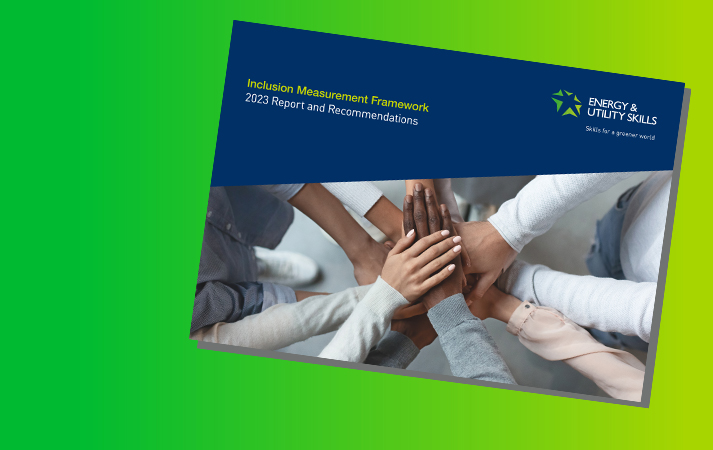Inclusion Measurement Framework
Launched in 2020, the Inclusion Measurement Framework collates data on equality, diversity, and inclusion (EDI) across the energy and utilities sector as part of the sector’s Inclusion Commitment.
Measuring across the employment lifecycle from recruitment, through to progression and retention, the results have identified where change needs to happen for the sector to represent and reflect the communities the sector serves.
You can access the latest Inclusion Measurement Framework report here.
“While the 2023 results demonstrate some progress, the sector is still significantly behind being reflective of the UK workforce across many diversity characteristics. With recommendations that include increased accountability for leadership engagement in EDI, the report offers key insights on where to focus our efforts as individual organisations and as a sector.”
Louise Parry, Director of People and Organisational Development, Energy & Utility Skills.
Sector Improvements
The 2023 results show positive improvements within the sector as a whole.
Women now comprise 30% of the sector, a rise from 26% in 2022, with a corresponding 30% representation of women in leadership positions. The water industry has the highest levels of female representation at 35%, an increase of 7%.
Representation of employees from ethnic minority backgrounds in the sector workforce has increased to 12%, up from 7% in 2022. The development of employees from ethnic minority backgrounds has increased alongside a significant increase in promotions, at 10%, up from 3%.
Additionally, this year’s data shows an increase in LGBTQ+ representation from 1% in 2022 to 3% in 2023, nearing parity with the UK workforce representation.
The Ongoing Challenge
Although progress has been made in addressing the issue of ethnically diverse candidates being screened out during recruitment, this still requires improvement.
Disabled people remain significantly underrepresented across the energy and utilities sector, making up 4% of the workforce, compared to 23% across the UK.
Women and ethnic minorities are underrepresented compared to the UK as a whole and both women and employees from ethnic minorities are leaving at increasing levels.
The 2023 Inclusion Measurement Framework report provides five recommendations for action and highlights the inclusion priorities for individual organisations and the sector overall.
To participate in the 2024 Inclusion Measurement Framework:
Participation is free of charge and open to all companies in the energy and utilities sector and its supply chain. Register your interest to participate in the 2024 Inclusion Measurement Framework here.
We will be in touch to ask you to provide your data as the data submission window opens later this year. In a best endeavours approach, participating organisations are invited to provide the data they can.
The results will be published in early 2025.
Resources:
- 2023 Inclusion Measurement Framework report
- Sector EDI Insights and Best Practice Event recording
- Register your interest for the 2024 Inclusion Measurement Framework
Find Out More
If you’re an employer and keen to learn more about the sector’s inclusion commitment and get involved, please contact communications@euskills.co.uk
To find out more about membership and our policy work, please contact 0121 713 8255 or email membership@euskills.co.uk.
